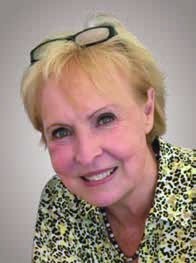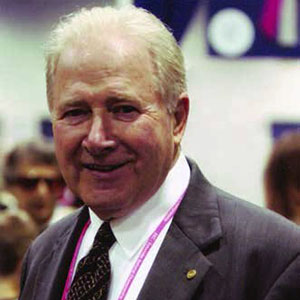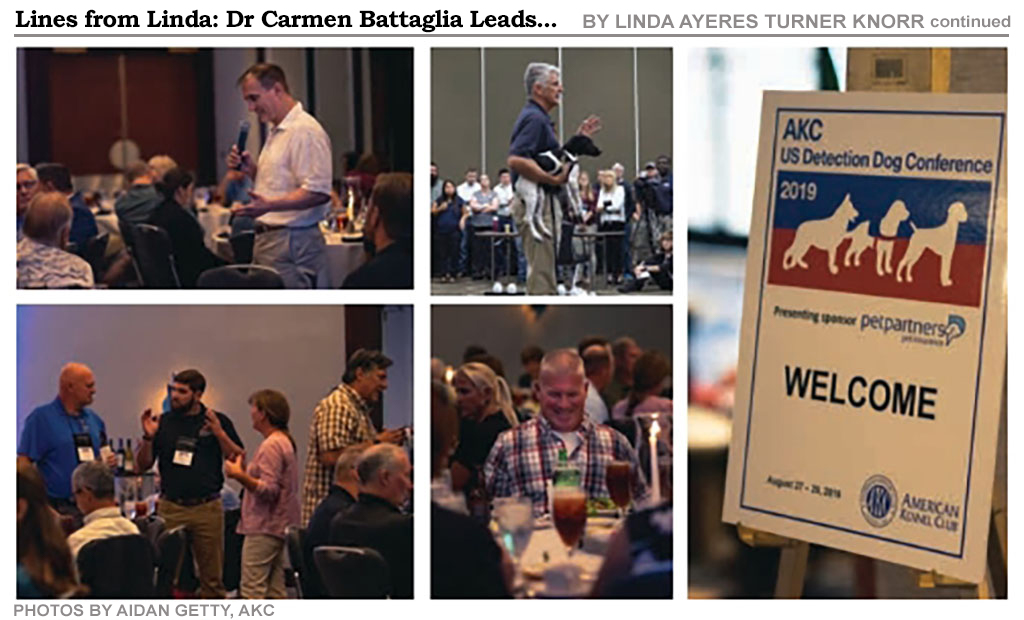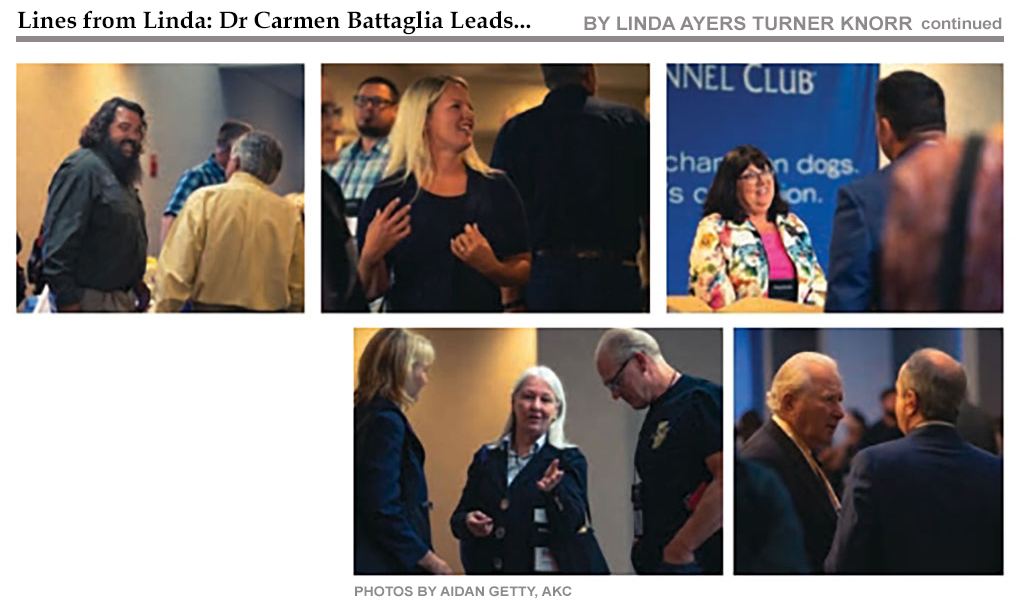Parent Category:
Lines from Linda
BY LINDA AYERS TURNER KNORR
DR. CARMEN BATTAGLIA LEADS AKC DETECTION DOG TASK FORCE

 Dr. Carmen Battaglia is a multifaceted leading gentleman of the dog world. Widely admired for his enormous impact on the sport his contributions are endless. With Masters and Doctorate degrees from Florida State University he is recognized worldwide as a researcher, lecturer and author. He has served on the staffs of Emory University, Florida State University, DeKalb College and the University of Tennessee Space Institute. Dr. Battaglia's research on puppies, Early Neurological Stimulation, and the risks of bloat have been published in professional veterinary journals. This is just one example of over 60 articles and many books we have authored.
Dr. Carmen Battaglia is a multifaceted leading gentleman of the dog world. Widely admired for his enormous impact on the sport his contributions are endless. With Masters and Doctorate degrees from Florida State University he is recognized worldwide as a researcher, lecturer and author. He has served on the staffs of Emory University, Florida State University, DeKalb College and the University of Tennessee Space Institute. Dr. Battaglia's research on puppies, Early Neurological Stimulation, and the risks of bloat have been published in professional veterinary journals. This is just one example of over 60 articles and many books we have authored.
The German Shepherd Dog Club of America has chosen Carmen to represent them as their AKC Delegate for the past 26 years and the AKC Delegate Body has repeatedly elected him to serve on the AKC Board of Directors. Other roles have included serving as President of AKC Reunite, and serving on The National Genetics Committee, The Canine Health and Education Committee and AKC's Committee for the Future. He judges more than 40 breeds and is highly regarded for a program he developed called Breeding Better Dogs.
Carmen and his wife Nancy are Georgia residents. There he served as Chairman for the Study Group on Vicious Dog Legislation. His committee's recommendations have been used as model legislation in several states.
As Chairman of the AKC Detection Dog Task Force, Dr. Battaglia just wrapped up the three day American Kennel Club 2019 U.S. Detection Dog Conference in Durham, North Carolina. Attendees included persons involved in national security from government, law enforcement, business leaders, educators, breeders, trainers, etc.
As our changing world brings fears of terrorism involving explosives, drugs and mass shootings, the need for trained detection dogs in America and abroad has sadly increased tremendously. For more than 50 years our country has depended on importing these working dogs from European breeders. According to the US Departments of Defense and Homeland Security 90 percent of working dogs used for security come from overseas breeders. Worldwide security threats have increased the need in other countries as well creating great shortages of dogs. Worsening the crisis, the best dogs are being kept abroad and not being available to us.
To respond to this crisis, Dr. Battaglia says, “As the largest dog registry in the country, and an advocate for breeding for type and function, we want to use our expertise and resources to collaborate, raise awareness and educate breeders with the goal of finding practical solutions to this shortage.”
Through the AKC Detection Task Force, Dr. Battaglia shared the following information on what breeders and Patriotic Puppy Raisers need to know.

In 2016, the US Senate held three hearings about the security of our airports, borders and infrastructure. Following these hearings the AKC was asked to help. The AKC Board responded by establishing the AKC Dog Detection Task Force. The mission was to bring together the stakeholders, develop a pilot program, involve the breeders and puppy raisers and increase the supply of needed dogs.
Breeders who have an interest in this program apply through an application process that is reviewed for acceptance by AKC consultant, Scott Thomas. Applicants are screened for their willingness to breed their females, socialize the pups produced and enrich their experiences until they are 8-10 months of age. The AKC Dog Detection Task Force also works with puppy raisers. These are individual willing to socialize and help develop young puppies using recommended protocols until they are 8-10 months of age. Breeders and puppy raisers work out their own financial arrangements.
APPLICANTS WHO BECOME A PARTICIPANT
The success of the Task Force is based on breeder and puppy raiser involvement. It requires breeders to breed, raise and develop pups and participate in a yearlong data gathering the program.
The pilot program of the AKC Dog Detection Task Force currently uses two breeds that are popular with many government agencies and private sector vendors. They are the Labrador Retriever and German Shorthair Pointer. Adjunct breeds have also been added based on their breed history as a detection or patrol dog.
PARTICIPANT EXPECTATIONS
he objectives of the Dog Detection Task Force include behavioral and DNA studies that are used to better understand breeding methods, kennel life, maternal influences, nutrition, and ways to make improvements. In order to accomplish these objectives those selected will be expected to:
- Plan to produce a litter with the intention of holding back one or more puppies to be dedicated to this program for one year. Breeding stock will include only those dogs that meet the health initiatives recommended by their parent club
- Complete timely reports and take videos of their pups as they develop
- Participate in conference calls and webinars hosted by the AKC consultant
- Participate in weekly reporting and quarterly video testing
- Record and submit data weekly on each pup
- Submit a DNA mouth swab that is provided which will be used for research
- Actively participate in evaluations scheduled at 3, 6, and 9 months of age
- Submit on a quarterly basis behavioral videos of each dog performing a standardized test (ACS/TSA)
- Receive and use feedback about puppy development based on reports and videos submitted
- Be willing to share information and learn from others
- Breeder participants in the pilot will be given access to a password protected site where information is stored
- Puppy Raisers agree to socialize and train a puppy (8-12 weeks) using suggested protocols and be dedicated to this program for one year
- Priority will be given to the two target breeds
SUPPORT FOR PUPPY RAISERS
Puppy raisers are a special feature of the AKC Dog Detection Task program. These individuals help by raising a puppy for up to 10 months of age. Many puppy raisers with children provide an ideal situation for a puppy’s development. The protocols developed by the AKC consultant include socialization, enrichment and training periods. Puppy raisers are expected to provide information and videos as pups develop. They are expected to participate in the evaluations at 3, 6 and 9 months of age.
Breeders who place puppies with puppy raisers select their own puppy raiser and enter into their own agreements regarding any financial considerations for raising the pups and how the costs and expenses will be managed. The final disposition about puppy’s, their placement and selling price is made by the breeder
BUYERS
Most buyers are looking for young untrained dogs, called "green dogs". Experience shows that buyers are varied and include Federal and State Agencies, police departments, private vendors who are breeders and others who purchase young puppies from breeders that they intend to train for their specific buyers.
The Task Force does not negotiate, own, buy or sell dogs but does provide advice and assistance. Agencies and organizational buyers are not recommended. If they are known to the Task Force they will be placed on an information list that is passed along for breeders to use.

SALE PRICE OF PUPPIES
Breeders who participle in the AKC Dog Detection Task Force have made the commitment to breed their females and provide puppies for sale. Because there are many buyers from different agencies, vendors and organizations, no one price has been set. Selling price is usually based on the age of the pup, the buyers need, and their opinion about the puppy’s potential and worth. Final selling price is generally related to age and performance at time of evaluation. Buyers are usually looking for well socialize puppies that are comfortable around children, adults, crowds, new places, different surfaces, smells, are happy, upbeat, playful, willing to chase and retrieve a ball or toy. Many buyers will want to see how pups handle isolation and confinement. There- fore, breeders and puppy raisers are encouraged to use a dog crate when preparing and developing their pups. Depending on age and the needs of each buyer, performance becomes the important factor in determining price. The market for a well socialized pup is large and breeders whose pups demonstrate the traits mentioned generally demand the higher prices.
There is also a market for pups not selected. Breeders who decide to sell pups early will learn there are other buyers looking for older pups. To help these breeders, the AKC supports a website and a program called "AKC Market Place" where breeders can list their pups by breed and age. Market Place provides information about the breeder and the pups for buyers to review. Experience shows that many buyers prefer older, well socialized pups that has been exposed to an enriched environment which makes them ideal for placement in a family or home environment.
ADJUNCT AND NON-TRADITIONAL BREEDS
Adjunct and non-traditional breeds, their breeders and puppy raisers are com- mended for their desire to participate in this program and for their willingness to help in this national security effort. Because of limited time and resources only two breeds were identified in the current pilot program. Adjunct breeds are those known for their established history and versatility as a working dog breed. Some adjunct breeds are used for single-purpose (detection only), others for dual-purpose (patrol and detection). Their participation is welcomed and they will have access to the resources of this pilot along with reports and suggestions. Feedback and recommendations about their dogs and pups will be provided as time permits.
Adjunct and non-Traditional breeders who choose to become involved do so with the understanding that they will complete the application and be accepted.
The expectation from these breeders and puppy raisers (Adjunct and non-traditional breeds) follows:
BREEDERS AND PUPPY RAISERS CAN EXPECT FROM THE AKC CONSULTANT
- Assistance and help via email, website, and social media
- Advice and counsel during whelping, weaning, socialization and enrichment periods
- Recommended protocols during socialization, enrichment and training periods
- Feedback about puppy videos submit- ted (breeders and puppy raisers)
- Guidance throughout a process that answers questions that arise regarding weaning, socialization and development of the pups
- Personal and individual dog or puppy information will not be shared with others
- Cumulative data about the dogs and pups will be shared with those involved in approved research
- Be willing to share information and learn from others
All breeders including those in the adjunct and non-traditional breeds are expected to negotiate with buyers the successful placement and price for their dogs and puppies. The Task Force does not negotiate, own, buy or sell dogs but does provide advice and assistance. If they are known to the Task Force they will be placed on an information list that is passed along for breeders to use.
More information is available at:
For information about AKC Dog Detection Task Force contact: Melissa Ferrell: Program Manager, (919) 816-3577, or email: Melissa Ferrell to Melissa.ferrell@akc.org
For further information about the AKC Dog Detection Task Force breeding program contact: Scott Thomas at scott@purposeraisedpup.com (210) 392-4109
Following the events of 911, Brussels, Boston, Las Vegas, New York, London and too many more in addition to the increased number of natural disasters, the need for sent, explosive detection and patrol dogs has greatly increased. "Perhaps you would be willing to raise one puppy to protect our country."
About the Author
Carmen L Battaglia holds a Ph.D. and Masters Degree from Florida State University. As an AKC judge, researcher and writer, he has been a leader in promotion of breeding better dogs and has written many articles and several books.Dr. Battaglia is also a popular TV and radio talk show speaker. His seminars on breeding dogs, selecting sires and choosing puppies have been well received by the breed clubs all over the country.

